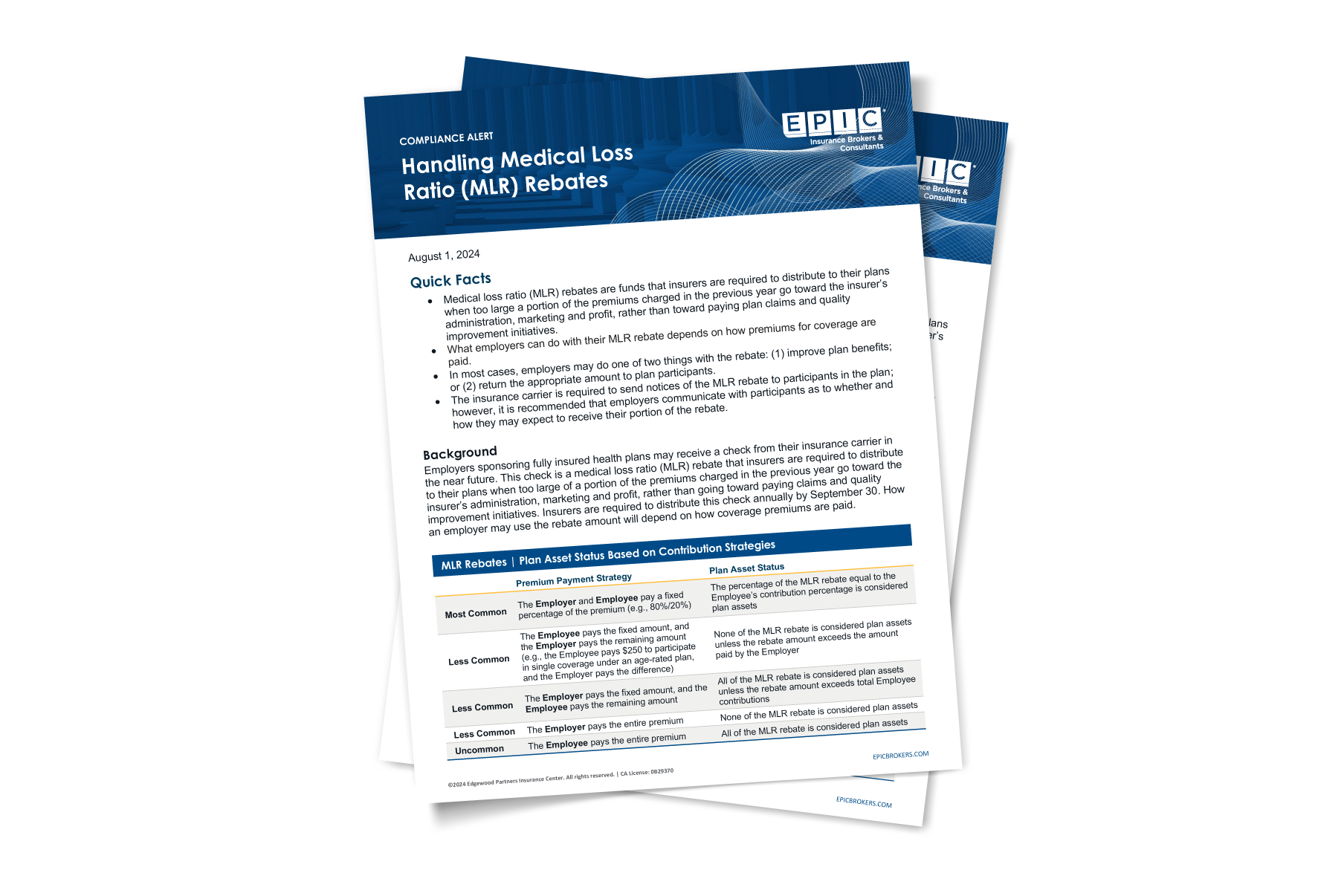Let our team help you navigate the ever-changing benefits compliance landscape each month. Check out this month’s latest alerts, additional updates, and resources hot off the press:
Employee Benefits Compliance Alerts
This month’s Compliance Matters newsletter provides a comprehensive review of the following topics. To obtain your copy, please use the form below to download.

- New Executive Order Revisits Price Transparency
- Independent Contractor Compliance Considerations
- Voluntary Benefits Compliance & Tax Considerations
- 2025 State Regulation Series: San Francisco Health Care Security Ordinance Refresher
- 2025 State Regulation Series: Massachusetts PBM Law | House Bill 4653
- EB Litigation Series: Ninth Circuit Dismisses Church’s Abortion Coverage Lawsuit
Download this month’s alerts
Additional Updates & Resources
Court Rejects ACA Section 1557 Discrimination Claim for Weight-Loss Drugs
In February 2025, a federal court dismissed a class action lawsuit alleging discrimination under the Affordable Care Act (ACA) Section 1557 for failure to cover weight-loss drugs to treat obesity. ACA Section 1557 protects individuals against discrimination based on disability. The court noted that disability is a key requirement for a claim of Section 1557 discrimination and that the plaintiff had not plausibly shown that she was disabled.
In December 2024, EPIC released a Compliance Matters Alert on a different but similar case citing Section 1557 discrimination. That case is still pending. Section 1557 discrimination and the use of weight-loss drugs continue to be a hot topic, and plan sponsors are encouraged to monitor developments with these lawsuits and changing regulations. EPIC will continue to provide updates as they are available.
Proposed Regulations on 2025 Marketplace Integrity and Affordability
The Centers for Medicare & Medicaid Services (CMS), through the Department of Health and Human Services (HHS), released proposed regulations for health insurance exchanges and benefits under the Affordable Care Act (ACA) in March 2025. Along with the proposed regulations, CMS released a fact sheet. The proposed rule, if finalized, may impact individual health coverage available through public Marketplaces beginning in 2026. Among other things, the rule proposes shortening the open enrollment window (to November 1 – December 15), increasing eligibility verification and reconciliation requirements for premium tax credits, and adjusting the methodology used to set premiums. It is estimated that some of the changes may result in lower overall premiums. For applicable large employers who offer an Individual Coverage HRA (ICHRA), a reduced premium for the lowest-cost silver plan could make it easier to make an affordable offer of coverage.
Part of the proposed regulations prohibits health insurers from providing coverage for “sex-trait modifications” as an essential health benefit (EHB) with plan years starting in 2026. Under the ACA, small group and individual health insurance plans must provide coverage for EHBs. Large group and self-funded plans are not required to provide coverage for EHBs; however, if they do provide such coverage, they cannot impose an annual or lifetime limit on those services. Self-funded plans must model their coverage based on an EHB state benchmark plan. Some states’ EHB-benchmark plans cover sex-trait modification as an EHB. If HHS’s regulations are finalized as proposed, starting in 2026, insurers in those states could no longer cover sex-trait modification as an EHB in the state. While these rules are proposed, not final, and primarily impact the small and individual markets, there is no immediate action plan sponsors need to take. EPIC is monitoring these rules and will provide any updates as they develop.
Plaintiff Files Amended Complaint in Johnson & Johnson Fiduciary Lawsuit
On March 10, 2025, an amended class action complaint against employer plan sponsor Johnson & Johnson was refiled in the United States District Court for the District of New Jersey (the Court). The amended complaint comes less than two months after the Court dismissed the lawsuit due to a lack of plaintiff standing. For more information on the initial complaint and the dismissal, access our prior Alerts from March 2024 and February 2025.
The amendment adds a plaintiff, Robert Gregory, and adds additional details about the original plaintiff, Ann Lewandowski, in an attempt to create standing for Lewandowski. The complaint alleges that Mr. Gregory “was forced to pay over two times pharmacy acquisition cost for prescriptions through the Plan” and that Ms. Lewandowski was required “to pay more out-of-pocket for prescription drugs than she otherwise would have paid. This is true even though she nominally hit her ‘out-of-pocket maximum’ for 2023.” This allegation is in rebuttal to the Court’s dismissal for lack of redressable standing.
The plaintiffs also call out the defendant’s relationship with its employee benefits consultant (EBC) as a violation of its duty to act prudently stating, “Prudent fiduciaries exercise – and are required to exercise – independent, prudent, and impartial fiduciary judgment even on matters for which they receive advice from EBCs,” and Prudent fiduciaries obtain the required disclosures from their EBCs and ensure that the disclosures are sufficiently clear and unambiguous, and that no conflict of interest exists, before entering into, renewing, or extending their contract.”
The January 2025 dismissal was a temporary victory for employers, but this amendment serves as a reminder that the issue is not yet resolved. The J&J case and similar lawsuits emphasize the importance of ERISA and plan sponsor fiduciary responsibility to act prudently and in the best interest of the plan. Plan sponsors should monitor developments with these cases and take steps to protect themselves from similar allegations. EPIC is monitoring this case and will continue to provide updates for plan sponsors regarding this lawsuit and other similar cases that may result.
Another Fiduciary Lawsuit Dismissed Due to Lack of Standing
On March 24, 2025, Judge David Shultz issued an opinion in the fiduciary breach case Navarro v. Wells Fargo dismissing the case for lack of standing. The opinion is similar to the one rendered in January in another fiduciary breach lawsuit, Lewandowski v. Johnson & Johnson, regarding the dismissal. EPIC is monitoring developments with this lawsuit and will provide a detailed analysis in our May Compliance Matters release. For background on Navarro v. Wells Fargo, access our prior Compliance Matters Alert released in September 2024.
Court Grants Extension in Mental Health Lawsuit
In March, the Department of Health and Human Services (HHS) and the Department of Labor (DOL) requested an extension of time to respond to the lawsuit filed by the ERISA Industry Committee (ERIC) alleging that the Mental Health Parity final rules released in September 2024 violate numerous federal laws. For a detailed summary of the final rules, see our prior alert released in October 2024, and for a detailed summary of the ERIC lawsuit, see our March 2025 alert. As expected, the Plaintiffs filed a motion in opposition, stating, “the Departments’ request for a three-month delay is self-evidently unreasonable. Instead, absent a stay, the litigation should move forward expeditiously.” On March 25, 2025, Judge Timothy Kelly issued an order granting the government a 45-day extension, giving the Defendants until May 12, 2025, to answer. EPIC will continue to monitor any developments with this lawsuit and provide updates as they become available.
Monthly FAQ: How are domestic partners treated for purposes of Section 125 mid-year change events?
Because employee contributions are handled pre-tax through a cafeteria plan, we have to follow Section 125 election change rules, which only permit mid-year changes to pre-tax elections in the event of a recognized life event or change in status. However, because contributions for a domestic partner’s (DP’s) coverage do not qualify for tax-favored treatment, Section 125 election change rules don’t apply. Section 125 plans are governed by federal law, which does not recognize DPs as spouses. While some states require benefits for DPs in the same manner as spouses, federal law does not recognize domestic partners, registered or otherwise.
Because contributions for DP coverage do not qualify for tax-favored treatment, the Section 125 election change rules do not apply. If an employee asks to enroll/drop a DP mid-year, it could be allowed if the carrier allows it, although in practice, most carriers will not. Note that if a carrier or employer does allow a mid-year drop of coverage, there may not be another opportunity for the DP to re-enroll outside of open enrollment.

More Compliance Resources
- Sign up for our in-depth Compliance Webinars
- Learn about our Compliance Consulting Services

WANT TO GET COMPLIANCE MATTERS IN YOUR INBOX?
Sign up for the monthly newsletter.
